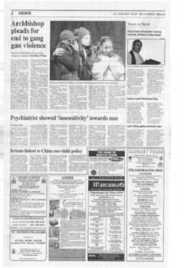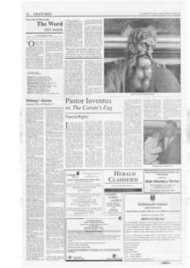Page 10, 24th January 2003
Page 10

Report an error
Noticed an error on this page?If you've noticed an error in this article please click here to report it.
Tags
Share
Related articles
In A Few Words
For The Love Of God Peace
Sport
One Of His Sisters "backchats" The "catholic Young Man"...
The Day I Threw
/ a told that the most dangerous of sports is
to do with horses. The number of people who break their backs and even necks is, in compar
'
isn i on to other sports. incredibly high. I certainly
remember reading Christopher Reeve's Still Me and being deeply impressed by the man and the way he was going through his paralysing accident off the back of a horse. I remember also Andrew Motion, the poet laureate, coming to Downside and reading a poem, which I think was called "Piebald", about a horse that had been the cause of the death of the mother of the family, and how it was neglected and living morosely on its own in a field, almost despised as a scapegoat.
These memories have come to me because I have been thinking recently about the risks of life itself. More particularly, I have been thinking of the whole world of risk assessment that is now part of school life. A 57-page document came round recently at Downside, the result of a committee's work on security and risk assessment. Every time a group of boys goes out, a risk assessment form has to be filled in and, on return. another form has to be completed. It is incredibly tedious. but is a reaction to legal requirement and an attempt to ensure that our pupils are as safe as possible.
Last rugby term. on four separate occasions the air ambulance helicopter came to school and I watched with trepidation boys being flown off to Yeovil Hospital. The case against the Welsh Rugby Football Union after a player was paralysed in a collapsing scrum and the death of a schoolboy in a rugby match make me extremely aware of risk.
There has been serious discussion in the media as to whether rugby should be played at schools. It is a very physical sport and I know that some parents are nervous of their children playing. I recall one mother, Mrs aiming, seeing her son at the bottom of a scrum and being attacked by a member of the opposition. She told me that she felt like going onto the pitch and telling the offending aggressor to leave her little boy alone. Her son. Hamish, is a remarkably good rugby player, playing for our 1st XV and, indeed, for Somerset, and relishes the sport.
This is the very point, isn't it? To live a full life we have to take risks, yet we have to ensure that risks are not too great. We have medical personnel on our rugby touchlines. We have well-trained referees and we try to instil a consciousness of playing the game properly into pupils. Yet the voices wanting to abolish the game in schools grow louder.
Recently I read Nigel Stammer-Smith's comment on Future Hope, the children's home in Calcutta. The Daily Telegraph's Christmas appeal was raising money to buy Future Hope a sports field. Half the article was concerned with the irrefutable arguments for the value of sport, including rugby. Although Mr Starmer-Smith was talking about kids off the street, the arguments can apply to sport in general. He states that the initial attraction for the street kids is playing sport. Sport then acts as a catalyst and opens the way to a better life. As is pointed out, all of us who have played sport have learnt many things about ourselves and life in general. Team games, especially. teach independence and understanding of working for the benefit of all. "One becomes as important a cog in the wheel as anyone else, one builds friendship, one shares success and disappointment and one is in fact part of a team and one belongs." The shared experience is great. whether it is the joy of winning or the hurt of defeat, and provides lessons for life.
Many of my young men have gained confidence in themselves, have learnt skills in life from sport and have carried the confidence and this ability to master skills into other fields where they have had less self-assurance. The self-assurance they have gained on the sporting field has given them that extra chance in the world of academics, or public speaking, or music. or theatre. I am, on balance, in favour of continuing rugby. I am apprehensive of bodily damage, but am determined to keep it going because I know it has huge benefits.
Some years ago, Mary Carroll, the mother of Tom, one of our great 1st XV rugby players, used to come down to all matches. She and 1 used to meet behind the pavilion, shielding ourselves from the actual rugby match and saying our rosaries. Why not? This last season happens to have been the first unbeaten 1st XV rugby season we have had at Downside for 22 years. I am delighted, but am especially delighted that last term's rugby had no lasting physical damage. However, I now have to face the 1st XV in the Daily Mail Cup and a term of Sevens rugby. My rosary is still in my hand.
Dom Antony Suich is the headmaster of Downside School,
blog comments powered by Disqus















